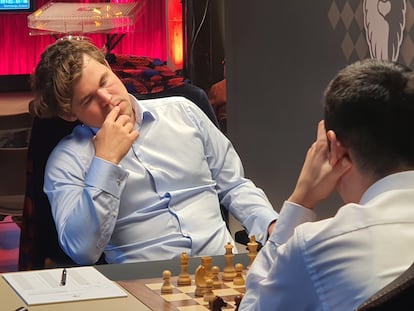Chess stars compete in opulent seclusion
Carlsen, Ding and six other players participate in an innovative Chess960 tournament held at a luxurious German resort


Many fans badmouth the Chess960 format (also called Fischer Random), maybe because it’s so unfamiliar. There’s a heated debate about this format that alters the starting positions of chess pieces, neutralizing centuries of knowledge on classical openings. However, it’s undeniable that the exclusive Weissenhaus private nature luxury resort on Germany’s Baltic coast is hosting an intense tournament. The players told us they’re pleased, but that may be due to the luxurious surroundings.
“I think we will grow to love this style of play, but it’s very stressful right now,” said Levon Aronian, an American of Armenian descent. Despite being treated exceptionally well to help combat exhaustion, many of his fellow players share this sentiment. The seaside hotel complex offers cozy houses with private saunas and serves delicious food daily. The resort owner and tournament organizer, German millionaire Jan Henric Buettner, meticulously tends to every detail with utmost care.
“This is very hard work,” said Magnus Carlsen, the number one chess player in the world. His wholehearted support for Buettner’s idea has been crucial in attracting press coverage and turning this tournament into a landmark event that continues to spark debate about classical chess versus Chess960. The main difference is that the latter format has 960 unique possible starting positions chosen at random. This forces players to think hard right from the start instead of relying on memorized opening sequences, which has become commonplace even among amateurs due to computer training models.
Apart from the luxurious surroundings, another tournament attraction is that it has no impact on world rankings. This helps create a much more relaxed atmosphere compared to regular competitions. The enjoyment on the players’ faces is evident as they gather at the intimate match venue, accompanied by coaches, friends or loved ones. Carlsen arrives hand in hand with his girlfriend, whose name he prefers to keep private. If you didn’t know, you wouldn’t think the Norwegian grandmaster was about to face a tough challenge.
A special guest draws the starting positions for the day’s games. Today it’s the beautiful Teresa Sara (Miss Angola), who picks 636. The chess gladiators shift into high gear. In the limited time available, they plan their strategies. Players are allowed to work as a team, so Aronian and world champion Ding Liren brainstorm ideas together. The Black — Nodirbek Abdusattorov, Fabiano Caruana and Vincent Keymer — do the same. It’s another unique dynamic that sets this tournament apart.
Meanwhile, Carlsen lets his girlfriend button up his shirt in the dressing room, which is stocked with dark chocolate, fruit, coffee, tea and other non-alcoholic beverages. He checks his clothes one last time. When the arbiter announces that there are two minutes to start time, Carlsen walks out to his table. He greets Abdusattorov with a brief smile and then carefully fills out the player information card. Carlsen rests his head in his hands for a moment to concentrate on his first move. The other players do the same, unlike classical chess where the real tension builds much later in the game after all the memorized sequences have been exhausted.

In the Chess960 format, players can take ideas from what’s happening on the other three boards. It’s often their first time facing a specific position, prompting Carlsen and his colleagues to take quick walks around the room during their turns. The matches are streamed online, with commentators Peter Leko and Tania Sáchdev expertly guiding millions of chess fans through the action.
Another interesting twist is that players agreed to have their heart rates monitored and displayed on screens during the matches. Magnus Carlsen, a sports enthusiast since childhood, maintains a heart rate between 80 and 90 at 33 years old. In contrast, younger rivals like Alireza Firouzja, a 20-year-old Frenchman of Iranian origin, often have heart rates around 140.
The only flaw in this picturesque setting is the underwhelming performance of Chinese grandmaster Ding Liren. Ding, a popular figure among colleagues, is still recovering from the stress of his victorious world title duel last year against Russian Ian Nepomniachtchi in Astana (Kazakhstan). Without elaborating, he acknowledges having significant sleep issues since then, which are linked to some psychological conditions.
Carlsen’s heart rate suddenly spikes from 82 to 109, sensing that Abdusattorov just made a mistake. The Norwegian wins the first semifinal match, while Caruana falls to Aronian in the second one. In the battle for fifth place, Ding faces another defeat at the hands of Firouzja. This chess format sees far fewer draws compared to its classical counterpart. The blood of the gladiator chess kings flows abundantly in Weissenhaus.
Sign up for our weekly newsletter to get more English-language news coverage from EL PAÍS USA Edition
Tu suscripción se está usando en otro dispositivo
¿Quieres añadir otro usuario a tu suscripción?
Si continúas leyendo en este dispositivo, no se podrá leer en el otro.
FlechaTu suscripción se está usando en otro dispositivo y solo puedes acceder a EL PAÍS desde un dispositivo a la vez.
Si quieres compartir tu cuenta, cambia tu suscripción a la modalidad Premium, así podrás añadir otro usuario. Cada uno accederá con su propia cuenta de email, lo que os permitirá personalizar vuestra experiencia en EL PAÍS.
¿Tienes una suscripción de empresa? Accede aquí para contratar más cuentas.
En el caso de no saber quién está usando tu cuenta, te recomendamos cambiar tu contraseña aquí.
Si decides continuar compartiendo tu cuenta, este mensaje se mostrará en tu dispositivo y en el de la otra persona que está usando tu cuenta de forma indefinida, afectando a tu experiencia de lectura. Puedes consultar aquí los términos y condiciones de la suscripción digital.








































